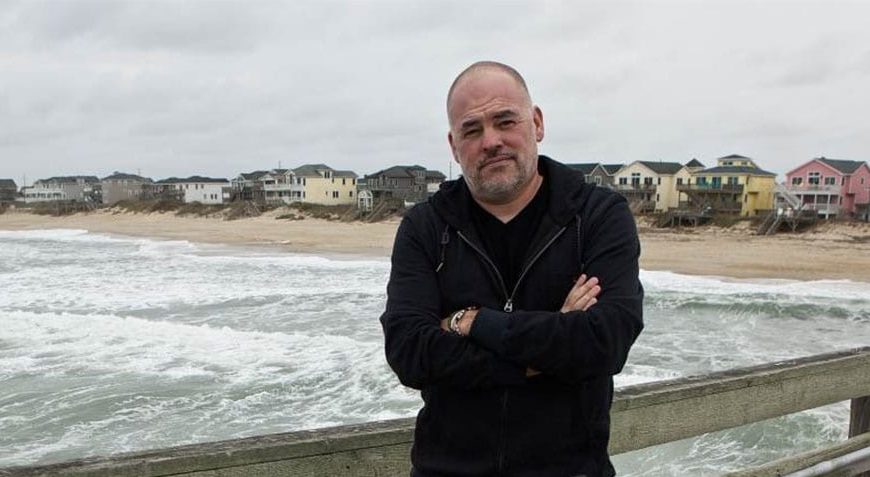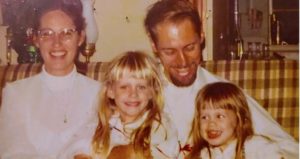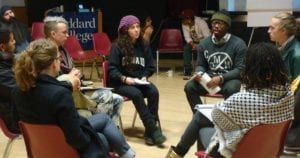 An interview with Kirsten Childs…
An interview with Kirsten Childs…
By Aleesha Nash and Brad Bass
“I am a writer.” Uttering these words can be a challenge for many of us. Allowing our personal thoughts to be exposed can make us feel naked and often, free. Learning to shed the layers of insecurity, indecisiveness, and fear can be daunting, but accepting that we have something worthy to tell the world is a way for us to begin. As students of Goddard College, we are afforded the chance to grow, morph, fail, discover and hone our skills in a protective and inclusive environment. We get to share in this unique experience together with the guidance of professionals who see us as peers.
Deborah Brevoort gave her Fall 2016 advising group the extraordinary opportunity to connect with the prolific writer, Kirsten Childs. Her credentials span various works, but we had the pleasure of examining her musical, The Bubbly Black Girl Sheds Her Chameleon Skin. This is a funny and poignant story about a little black girl named Viveca Stanton and her journey of self-discovery. She learns of the Birmingham church bombings, and that young black girls, like herself, have died. Her response was to put on a smile, lead with her bubbly personality, and hope that racism, sexism; everything hurtful would simply fall away. As the musical progresses, we watch as Viveca grows up and eventually has to face the effects of her denial. This musical is an important part of the musical theater canon as it allows audience members to consider their own reaction in the face of adversity.
As aspiring playwrights and librettists, we were given the chance to speak with Ms. Child’s in an open forum. She gave details about her artistic choices and advice on how to move past your fears when facing the blank page. It was a refreshing experience for us all. Ms. Childs is a lovely human being who embraced our queries with warmth and honesty. Below is a summary of the questions and responses from the entire advising group (AG) and Ms. Childs (KC).
AG: What made you choose chameleon in describing Viveca’s skin?
KC: The skin I was referring to wasn’t Viveca’s skin; it was the actual skin of the chameleon, which changes color to protect the chameleon in dangerous situations. And the survival technique of a chameleon felt like a perfect metaphor for the life lessons I sensed as a middle class black girl of the sixties. As far as I could see, many white people were threatened by black anger; many males were threatened by female assertiveness; many African-Americans were threatened by what was perceived as behavior traitorous to the race. So, it became essential to me to learn how to act in a non-threatening manner to feel safe, and to keep the peace with all groups.
AG: Is Chitty Chatty [Viveca’s doll and character in the musical] based on a doll from your childhood?
KC: Chitty Chatty was actually based on Chatty Cathy, a state of the art doll made by Mattel. She was a talking doll that was coveted by little girls in the 60s. Since little girls sometimes used their dolls as confessors, I simply took a step back in time and got into the mindset of a little black girl with a little white Chatty Cathy doll. Mind you, when I was a little girl, I never said or even allowed myself to think any of the things Viveca admits to her doll – for fear of judgment, but it was cathartic to let Viveca go there.
AG: Did you consciously create songs to reflect different decades as Viveca was growing up in their times?
KC: Yes, I strongly felt that I wanted to write a musical containing popular music of the different eras, music that would fit the character’s voice and her circumstances. It wasn’t too hard to find inspiration. I created music based on what I liked listening to (Motown, funk, British invasion, surf music, counter-culture folk/psychedelic rock, disco, along with classical, jazz and show tunes).
AG: As a female black writer, do you ever find yourself trying to negotiate between writing for yourself verses writing about and for marginalized groups out of obligation?
KC: You absolutely have to abandon any negotiation. You have to abandon everything but your own sense of truth. Sometimes what you feel (what your character feels) is not what you’ve been told you’re supposed to feel or what you think is right to feel or what your mother would be proud to know you feel. You’ve got to deal with that uncomfortable, possibly ugly, possibly “Oh God I’m so ashamed I feel this way, I’m just like all those people that I’ve felt disgust for” feeling. After you come out of your writing, you can go back to vehemently tweeting your feelings or posting on Facebook. But while writing you can’t negotiate because if you do your writing will suffer from limits you’re putting on yourself.
AG: As someone who had to endure the dreaded pressing comb as a child, was there any hesitation on your part on including an African-American custom that a large percentage of your audience might not know about?
KC: Once the floodgates opened re all the “black people secrets” that I had been taught all my life not to expose, I felt liberated. I also saw how the exposition of those secrets didn’t make my community or me any less. I wasn’t concerned if anyone didn’t understand what was going on. What I knew was that I was able to translate my personal truths to a life on stage with vitality. The audience would then recognized that vitality and truth, and if they wanted to know more about it, it was their not my responsibility to learn more about it.
AG: Did you achieve your desired objective?
KC: Well, I certainly slept better after I wrote the show!
The creative process for The Bubbly Black Girl Sheds Her Chameleon Skin was eye opening. The forum discussion provided insight to the multiple facets of self-discovery while writing. We gained knowledge of the importance of being introspective, yet, patient with our own growth and exposure to the world. The group learned so much about making decisions for our own writings, decisions that align with our personal beliefs and truths. After interacting with Ms. Childs, we did not feel separate or inadequate, we felt equal. We all felt a sense of belonging. We are all writers—students, librettists, teachers, advisors, and award-winning playwrights. The commonality between us all is simple and real, we need to share our hearts with the world.







